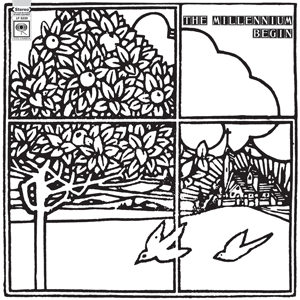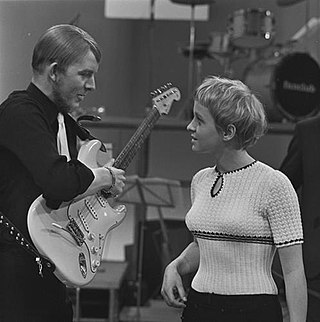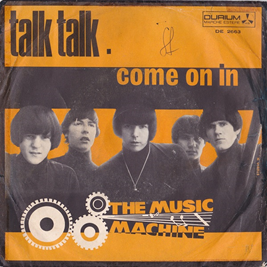
Ian Ernest Gilmore Evans was a Canadian–American jazz pianist, arranger, composer and bandleader. He is widely recognized as one of the greatest orchestrators in jazz, playing an important role in the development of cool jazz, modal jazz, free jazz, and jazz fusion. He is best known for his acclaimed collaborations with Miles Davis.

Bert Kaempfert was a German orchestra leader, multi-instrumentalist, music producer, arranger, and composer. He made easy listening and jazz-oriented records and wrote the music for a number of well-known songs, including "Strangers in the Night", “Danke Schoen” and "Moon Over Naples".

The Association is an American pop rock band from California. During the late 1960s, the band had numerous hits at or near the top of the Billboard charts and were the lead-off band at 1967's Monterey Pop Festival. They are known for intricate vocal harmonies by the band's multiple singers.

Donald Johnson Ellis was an American jazz trumpeter, drummer, composer, and bandleader. He is best known for his extensive musical experimentation, particularly in the area of time signatures. Later in his life he worked as a film composer, contributing a score to 1971's The French Connection and 1973's The Seven-Ups.

Curtis Roy Boettcher, sometimes credited as Curt Boetcher or Curt Becher, was an American singer, songwriter, arranger, musician, and record producer from Wisconsin. He was a pivotal figure in what is now termed "sunshine pop", working with the Association, the Millennium, Sagittarius, Paul Revere and the Raiders, Tommy Roe, Elton John, Gene Clark, Emitt Rhodes, Tandyn Almer, the Beach Boys, and others.

The Music Machine was an American rock band formed in Los Angeles, California in 1966. Fronted by chief songwriter and lead vocalist Sean Bonniwell, the band cultivated a characteristically dark and rebellious image reflected in an untamed musical approach. Sometimes it made use of distorted guitar lines and hallucinogenic organ parts, punctuated by Bonniwell's distinctively throaty vocals. Although they managed to attain national chart success only briefly with two singles, the Music Machine is today considered by many critics to be one of the groundbreaking acts of the 1960s. Their style is now recognized as a pioneering force in proto-punk; yet within a relatively short period of time, they began to employ more complex lyrical and instrumental arrangements that went beyond the typical garage band format.

Thomas Harvey "Sean" Bonniwell was an American singer-songwriter/guitarist, who was known as the creative force behind the 1960s garage rock band, The Music Machine.
The Millennium were an American sunshine pop band formed in Los Angeles, California, in 1967.
William George "Lee" Mallory was a singer, songwriter and guitarist who was part of bands including The Millennium and Sagittarius. His most successful single was a cover of the Phil Ochs/Bob Gibson song "That's the Way It's Gonna Be". The song, produced by Curt Boettcher, reached No. 86 on the charts and was a surprise hit in Seattle. A CD by the same name was released in 2002, with many songs and demos Mallory had recorded during the 1960s. Lee Mallory helped start the California Sound of the 1960s.
Michael Fennelly is an American musician known for his work as a singer and songwriter in the 1960s and 1970s, notably in The Millennium and Crabby Appleton.

Begin is the sole studio album released by the American music group the Millennium released in July 1968 on Columbia Records. The group first appeared after members from various Los Angeles pop groups such as the Ballroom, Sagittarius and the Music Machine decided to collaborate on an album.
The Goldebriars were an American folk quartet in the early 1960s, most notable for including a young Curt Boettcher as a guitarist and vocalist. The group also included two sisters, Dotti and Sheri Holmberg, with Ron Neilson as lead guitarist and banjo player.

Victor Harvey Briggs III was a British blues and rock musician, best known as the lead guitarist with Eric Burdon and The Animals during the 1966–1968 period. Briggs, a convert to Sikhism, later played classical Indian and Hawaiian music, and adopted the name Antion Vikram Singh Meredith.

Gerald Stanley Wilson was an American jazz trumpeter, big band bandleader, composer, arranger, and educator. Born in Mississippi, he was based in Los Angeles from the early 1940s. He arranged music for Duke Ellington, Sarah Vaughan, Ray Charles, Julie London, Dizzy Gillespie, Ella Fitzgerald, Benny Carter, Lionel Hampton, Billie Holiday, Dinah Washington, and Nancy Wilson.

And Then... Along Comes the Association is the debut studio album by the Association, released on Valiant Records in July 1966. It became one of the top-selling albums in America, peaking at number five, and remains the Association's most successful album release, except for their Greatest Hits compilation. The album's success was primarily credited to the inclusion of their two U.S. hits "Along Comes Mary" and "Cherish", which peaked at number seven and number one respectively on the Billboard Hot 100; "Cherish" was number one on Billboard's Top 40 list for three weeks starting on September 24, 1966.

Michael William Deasy is an American rock and jazz guitarist. As a session musician, he played on numerous hit singles and albums recorded in Los Angeles in the 1960s, 1970s and 1980s. He is sometimes credited as Mike Deasy Sr.

"Talk Talk" is the debut single of American garage rock band the Music Machine. It was released in November 1966, and produced the band's only Top 20 hit on the Billboard Hot 100. The song was included on their debut album, (Turn On) The Music Machine.
"The People in Me" is a song by the American garage rock band the Music Machine, written by Sean Bonniwell, and first released as a track on their debut studio album (Turn On) The Music Machine in December 1966 on Original Sound Records.

The Bonniwell Music Machine is the second and final album by the American garage rock band, The Music Machine, recorded under the renamed moniker, The Bonniwell Music Machine, and released on Warner Bros. Records, on February 10, 1968. As with their debut LP, the album again saw the band blending garage and psychedelic rock influences, albeit with a greater emphasis on psychedelia than on their previous album release. Prior to completing its recording, all of the group's original members, except for its creative force, Sean Bonniwell, departed, though they would still appear on some of the album's tracks.

(Turn On) The Music Machine is the debut studio album by the American garage rock band the Music Machine, released on Original Sound Records on December 31, 1966. It arrived just months after the group's hit single, "Talk Talk", propelled to number 15 on the national charts. Although the album was hastily recorded to capitalize on the Music Machine's popularity, (Turn On) The Music Machine became a moderate hit on the Billboard Top LPs chart, and is hailed today as a classic garage rock album. Another single, "The People in Me" was also released in support of the album.














